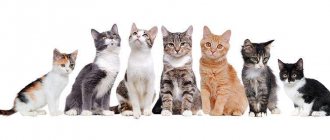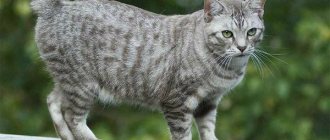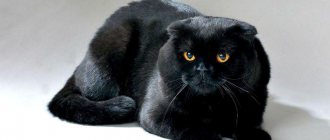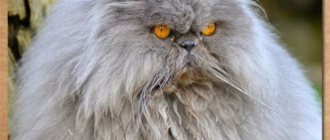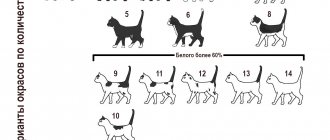a black cat and a black cat gave birth to white kittens because she looked at the snow for a long time? No. 2
Home > Document
I suggest you solve genetic problems yourself.
No. 1. A black cat and a black cat gave birth to white kittens because she looked at the snow for a long time?
No. 2. A woman (proband) applied to a medical genetic consultation with a request to determine the likelihood of having children suffering from albinism in the family. She is healthy, but there are cases of albinism in her family; her husband is an albino. Albinism in humans is inherited as an autosomal recessive trait.
No. 3 . Elderly parents (wife - 45 years old, husband - 50) gave birth to a full-term child with a flat face, low sloping forehead, oblique eye shape, pronounced epicanthus, light spots on the iris, a thick tongue protruding from the mouth, underdeveloped low-lying ears shells, abnormal growth of teeth, non-closure of the interatrial septum, transverse groove on the palm, there is a significant lag in mental development.
What disease are we talking about? What prenatal diagnostic methods should parents carry out to exclude the appearance of such a child?
No. 4. A young married couple turned to a medical genetic consultation with a request: to determine the likelihood of hairy ears in their offspring, since the husband has this trait. Hypertrichosis (hairy ears) is inherited as a trait linked to the Y chromosome.
No. 5. A young couple, who were planning to get married, but were concerned about the health of their future children, applied for a medical genetic consultation. Their anxiety is explained by the fact that in their families there are cases of children with six fingers. The wife has six fingers, the husband is healthy. Polydactyly (six-fingered) in humans is determined by dominant alleles of autosomal genes.
No. 6. A man with hemophilia marries a normal woman whose father suffered from hemophilia. What is the probability of having healthy children in this family?
It is known that the hemophilia gene is inherited as a recessive trait linked to the X chromosome.
No. 7. Syndactyly - fusion of fingers, is inherited as a dominant, autosomal trait. What is the probability of having children with fused fingers in a family where one of the parents is heterozygous for the analyzed trait?
No. 9. The daughter of a colorblind man marries the son of another colorblind man, and the bride and groom can distinguish colors normally. What will children's vision be like? It is known that the color blindness gene is transmitted as a recessive trait linked to the X chromosome.
No. 9. Parahemophilia - a tendency to skin and nose bleeding - is inherited as an autosomal recessive trait. What is the probability of having sick children in a family where both spouses suffer from parahemophilia?
No. 10. The childhood form of amaurotic familial idiocy (Tay-Sachs) is inherited as an autosomal recessive trait and usually ends in death by 4-5 years. The first child in the family died from this disease at the time when the second was due to be born. What is the probability that the second child will suffer from the same disease?
No. 12 Alcohol dependence is caused by an autosomal dominant gene (B), and the need for smoking and tobacco is associated with a recessive gene (a) located on the X chromosome. A non-smoking man who loves to drink married a woman who smokes and drinks. The man is homozygous for the alcoholism gene, and the woman is heterozygous. What is the likelihood of having children predisposed to alcoholism in this family?
Albino cat personality
The character of an animal rarely depends on color. So albino cats may be no different from their colored counterparts. Although it is worth noting here that the albinism gene can affect the health of the animal, but this point is already associated with changes in behavior.
Albino cats may be highly sensitive to sounds and bright lights. They are more vulnerable and therefore need attention and care. Such cats can follow their owner everywhere and get nervous if he is not nearby. In unusual situations (when moving, new animals and small children appearing in the family), albino cats can experience extreme stress.
Albinos can be more cowardly. If guests come to the house, they prefer to hide. Other cats may dominate them. Such animals are very anxious and modest. At the same time, they can be quite intrusive towards their owner, as they need increased attention.
Why did a white cat and a gray cat give birth to a red kitten?
How do a white cat and a gray cat get a red kitten? It's simple - from mom cat! And now a little more detail. The genetics of cat color are more complex than those of humans, and inheritance is more bizarre. Blonde parents can never give birth to a brunette child - such simple rules do not apply to cats. More precisely, the rules remain simple, there are simply many more “components”. The fact is that the color of cats is encoded by several genes. The appearance of a cat is determined not only by the gene responsible for the actual color of the coat, but also for the color “in general”, and for the presence (absence) and size of spots. In addition, the color gene is tightly linked to the sex chromosome. In humans, say, hair color is inherited regardless of gender. In cats, the color of the coat is inherited along with the female sex chromosome X. It turns out that a girl kitten can get color from both mom and dad, but the color of the coat of a boy kitten depends on the color of the mother cat (and her parents), i.e. e. inherited on the maternal line. First of all, the color of the coat is determined by the pair “there is color - there is no color.” The second option is true white cats - albino cats. By the way, this is a rarity, since the “color presence gene” is dominant (predominant): it alone is enough for the coat to “appear” at least some color. A true white cat can only be achieved if it inherits the “no color gene” from both parents. The second point is the color itself. In essence, there are only two main “cat” colors – black and red. Moreover, they are encoded by one gene: if it is “on”, it will turn out red, if it is turned off, it will turn out black. This particular gene is inherited only along with the X chromosome. Several interesting conclusions follow from this. Because cats only have one X chromosome, they can only inherit one variant of the gene. Consequently, the color of the cat’s fur is uniform. Cats have two X chromosomes, i.e. they can inherit two different color options and their color range will be more diverse. The color of the coat can be intense, and then we will see an animal with a very bright, striking color - for example, black. And perhaps a weakening of the color, and then we have a gray (blue) cat. And finally, there is a group of genes responsible for spots - their presence, location, size. The spot, by the way, may differ in color from the main color of the coat - it is something like a camouflage net thrown over the animal. And it can quite significantly change our perception of color. Now let’s return to our couple: a gray cat and a white cat. With a gray cat, in essence, everything is simple. This is a black cat (there are no other options), only faded, so to speak. Its color is slightly (or not slightly) weakened - that’s why the color turned out to be dim. And he can only give the kitten this color option – black. With a white cat it’s more difficult. There are several options for getting a white color for a cat. Firstly, she may be true white - an albino. Then she can give birth to a ginger kitten only in a pair with a ginger (red) cat. Secondly, a white cat may not be white at all. It seems to you. No, not because of poor color perception, mental disorders or taking certain medications. It's just that the cat's real color is masterfully disguised. Remember about the genes that determine the presence of spots? There are a great many options for the size and location of spots. Among them there are also very exotic ones - such as “a large spot on the entire animal.” That is: the cat is “really” black or red, but the color of the coat is completely covered by a large white spot. The cat appears to be dressed in a white camouflage suit covering her head. Sometimes you can guess about such a disguise by socks or a “hat” of a different color, and sometimes the true color is not visible. So a white cat who gives birth to a red kitten is most likely a red cat (red with a weakening effect). Over its true color, nature has thrown a veil - a white spot, so large that other colors are simply not visible. As you can see, the red neighbor's cat may have nothing to do with it at all.
Well, most likely because they, just like people, were related to redheads. This happens often in animals. There is probably nothing strange about this.
Genotypes of animals with the white spotting gene
WSWS
– most often the color is van or harlequin, where white occupies the maximum part of the body surface, the main color is presented in the form of a cap on the head, a fully colored tail and single spots on the sides or back. An animal with this genotype can be completely white.
WSwS
– most often the color is bicolor, where white occupies up to 60% of the body surface; a white belly, chest, neck and an inverted V on the face are required. When crossing two bicolors, any options for the amount of white are possible (van, harlequin, bicolor, no white).
Can white cats and a male cat have black kittens?
Indeed, can a white cat and a female cat give birth to a black kitten?
On the one hand, it seems, no. We know very well that blonde parents cannot have brunette children (at least those who studied genetics at school know this).
But what is true for people is not entirely true for cats. The color of cats and cats is not coded as simply as the hair color of people, and the answer will not be so categorical.
The fact is that “white” actually comes in three different varieties.
So, Option one - albino cat . In this color variant, white is a simple lack of pigmentation at all. The genes responsible for the “lack of color” are recessive, that is, they manifest themselves only together: in order to get an albino cat, it needs to receive exactly this gene from both its father and mother. Accordingly, such a cat and such a cat can only pass on a recessive variant to their offspring. This means that in principle an albino cat and an albino cat cannot have black kittens .
Option two - solid white spots . The coloring of cats includes not only the color of the coat, but also the presence or absence of spots. The gene responsible for the white spot on the skin is dominant, that is, it manifests itself even if only one is inherited.
How exactly the white spot appears depends on many other factors. Maybe just a spot around the nose, or maybe many, many white spots will merge into one - the animal will appear pure white. The option is, of course, rare, but why not.
In such a couple, the kitten may also inherit less pronounced spotting, including turning out black.
Option three - dominant white . This is the real white color, and the gene responsible for it is dominant. It completely suppresses all other coat colors (red and black), spots, haze or silver.
But that doesn't mean they don't exist. They simply cannot manifest themselves - in these animals, but in their offspring - it very well may happen.
Of course, it is possible that in one parent (or both) both genes encoding the trait “white coat color” are dominant, then another color option will not appear, even if killed. But this is still rare, and, most likely, one of the genes is not white. It is also quite possible that he is black, but the dominant white does not allow him to express himself.
Such a dominant white cat and a dominant white cat may well give birth to black kittens . Moreover, the probability of this is not so small - about three kittens out of sixteen.
The cat in the photo is unlikely to be an albino. So he has no reason to doubt!
White spot gene
"White spot"
suppresses pigmentation in a certain area of the body.
The area of spotting is determined by the degree of expression of this gene. It is designated WS
(former designation S, s) and manifests itself only in a dominant state. It has been noticed that animals with the WSwS genotype have less white areas in area than those with the WSWS genotype, where white occupies almost the entire surface of the body or the animal is completely white. The white spotting gene has no relationship with deafness.
Considering the variety of options for combining white and main color, the presence of other genes (polygenes) is assumed to affect the area of areas without pigment. Among cultivated breeds, it is customary to distinguish a group with 40-60% white in color - bicolors
, >60% white –
harlequins
and
vans
. Aboriginal breeds allow the presence of residual white in the form of “gloves”, “slippers”, “tie”. There are a number of breeds in which the presence of white markings is a mandatory feature, for example, the sacred Burmese cat and the ragdoll - “gloves” on their paws are required. The debate about the genetic origins of such a small number of whites is not over. Some suggest that this is a separate recessive gene, others suggest that it is the effect of polygenes on the white spotting gene.
Ways to determine the sex of a kitten and the main principles
Adult cats and female cats are easily distinguished by the appearance of their external genitalia, but the signs of difference in kittens are not sufficiently pronounced. There are correct and fairly simple ways to distinguish a cat from a cat. It is much easier to do this immediately after birth than after a few days. At the time of birth, the baby's fur is not so thick as to mask sexual characteristics.
Before the procedure, you must wash your hands thoroughly with warm water. You need to choose a soap without fragrances and wipe off all the moisture with a towel. If you are wondering how to determine the gender of a newborn kitten, look at its genitals. To do this, try to appease the furry woman in labor and calm her down. She should not be nervous, otherwise she may refuse the baby.
The kitten should be placed on a bare palm or the diaper should be preheated. For a better view, the tail must be raised. The shape and location of the anus and urogenital opening will tell you who you have in your hands. The distance between these holes plays a big role: in cats it is small and together resembles an inverted exclamation mark, while in a cat the organs resemble a colon with a gap of a centimeter or more.
Sure ways to determine the sex of a kitten:
- genital examination; estimation of distance by genitals; their shape; kitten color; sight; tail position.
WHAT WOULD HAVE HAPPENED WITHOUT THE “SIAMESE ALLEL”?
And everything would be very simple. Look at the photo below: without the temperature-sensitive gene in the DNA, this cat would simply be gray and, most likely, with yellow or green eyes.
Photo: atonkstail.com
Source: Interesting Cat Facts: Siamese Cats Are Walking Heat Maps
siamese cats
Comments ()
Log in to leave a comment
Algorithm of actions
There are significant differences in the genitals of cats and cats. How to find out the gender of a kitten? To check, you need to place the kitten in your palm and gently lift the tail. The distance between the holes should be assessed. How to identify a cat or cat: in boys the distance will be greater, in girls the vulva is located directly under the anus.
If we evaluate the shape of the genital organs, then in a boy they look like a colon (in some cases, an ellipsis). The female genital organs resemble an inverted exclamation mark or the letter i. In girls, the vulva is oval, and the opening of the penis in boys is round.
Between 10 and 12 weeks of age, boys begin to develop testicles (between the anus and penis). Until this time, it is difficult to distinguish them. When palpated, they are pronounced even in newborn cats. You need to feel in the middle: use your fingertips to carefully move it in the indicated place. The boy will have noticeable internal “peas” of 3-5 mm.
Other ways to check for a cat
The sex of a kitten is also revealed by some other signs. So, color can tell a lot about a newborn. Cats often have tortoiseshell colors (black, white and shades of red). Such genes are found only on X chromosomes, and as is known, an individual with two X chromosomes is a girl.
This is interesting! The color of cats is rarely tricolor - in this case, this indicates the presence of an extra X chromosome in its genome, which automatically makes the male infertile.
It is noteworthy that red predominates in the color of cats. Cats are rarely fiery in color. In addition, cats usually have thick hair in the genital area. Cats have no hair at all between the genital openings.
If you want to quickly find out whether a cat or kitten was born, all manipulations must be done quickly and carefully. Source: Flickr (Abraham_Nieto)
Some advise taking a closer look at your pet's face. It is believed that cats and cats have different looks. Girls have a wary look, while boys look self-confident. However, this method does not guarantee anything, because even a cat can be brave.
A very popular method: put the milk on and watch how the baby holds his tail while eating. If the tail is up, it's a boy; if it's down, it's a girl. A strong smell of urine also characterizes a cat - in a cat it is usually weaker.
Albinism, a series of genes "albino"
Albinism
– complete absence of pigment in the animal. These cats have white fur, pink nose and paw pads. Unlike dominant white and white spotting, albinism genes do not hide the main color, it is absent. Another feature is pink eyes with a bluish tint due to the translucency of the choroid of the iris. Their pupil is also pink because there are no pigment cells in the retina. The structure of a cat's eye is such that it will not be completely pink or red due to the tapetum. This eye is very sensitive to light; the cat always squints in the sun. The albinism gene does not cause deafness.
Geneticist Don Shaw discovered in 1973 that some Siamese white cats have blue eyes without a pink tint. His research showed that blue-eyed albino Siamese have ancestors of cats with dominant white and white spotting. Thus, the modern “foreign white” breed is not a manifestation of true albinism.
For a genetic understanding of albinism, the designations for alleles of genes for color distribution along the body are accepted: C, cb, cs, ca, c.
C
– a dominant allele in which the hair is colored throughout the body.
сb
– recessive to C, characterizes the Burmese color, which is somewhat lightened along the body.
cs
– recessive to C and cb, responsible for the Siamese color with the classic point variant, in which only the protruding parts of the body are colored.
sa
– recessive to C, cb, cs – blue-eyed albino – “foreign white” breed.
With
– recessive to all previous ones, true albinism with pink eyes.
Source
What else to pay attention to
In the process of finding out gender, the main thing is not to overdo it. It is very easy to harm a fragile creature, so refrain from being rude, hasty and persistent. You cannot touch a kitten, much less take it away from its mother, unless you first make friends with it. It is very important to reassure the mother as well.
The kitten should be held carefully. It is better to complete the procedure as quickly as possible, because weaning from the mother is unnecessary stress for the baby. You can't treat a cat carelessly. Under no circumstances should a newborn be held by the tail. It is advisable not to touch the kitten at all for the first three weeks: the baby takes on the smell of human hands, and the mother may refuse the unfamiliar creature.
No matter how much you want to check the gender, you cannot tear your baby off the breast. It is also impossible to hold a cat for a long time because in the first weeks their thermoregulation is poorly developed. Even just a few minutes can cause hypothermia. When conducting a tactile examination, you should not put too much pressure on the genitals.
A small kitten is so defenseless that it is better to postpone sex determination for several weeks if possible. If you want to quickly find out whether a cat or kitten was born, all manipulations must be done quickly and carefully. The differences between the genital organs of cats and male cats are quite pronounced, so there should not be any difficulties in the process.
Video on the topic
The white cat is a real miracle of nature. It can be huge or miniature, fluffy or smooth-haired - the appearance of this animal will not leave anyone indifferent. An original and beautiful name, chosen with love and attention, will help to emphasize the unusualness and charm of a snow-white cat.
Character of two-color cats
A cat's temperament directly depends on its color. It is believed that black and white cats have an ideal character. This is due to the heredity of the strong character of dark-colored cats and the softness of light-colored beauties. The bicolor cat is revered by the English and Scots. They perceive a meeting with a handsome man of this color as a blessing. In addition, they are very popular in Russia. These animals are stress-resistant, assertive, but easy to communicate with. They feel great even without human interaction and are very smart. They always understand the owner’s mood.
If they see that the owner is busy, they will not pester him. They usually don’t hold a grudge against the owner; they won’t take revenge on a person for an insult. They have this property from white cats, as well as their calm disposition. They are distinguished by amazing obedience and imperturbable composure. These cats love to play. This quality is stronger in them than in white or black cats. They are quite independent. Unlike other cats, they will not get their way in any way. Their dignity and pride will not allow this.
These cats get along well with people. They are capable of causing tenderness even in an overly serious person, not counting flexible and kind people. This is due not only to their wayward character, but also to their ability to remain calm.
Nicknames for white male cats
When choosing a name for a white kitten, you can also take into account its breed.
When choosing a name for a kitten, it is worth considering its breed, appearance, size, coat length and other important features. An animal with a pedigree has not one, but two or even three names, including the name of the kennel or derivatives of the names of the parents. It is important that the nickname chosen by the new owner fits harmoniously into this composition. A long construction should be euphonious, easy to pronounce and not cause unnecessary associations.
It is convenient if the chosen name can be shortened or slightly changed. For example, a baby Flowerfield can be called Filet, Fly or Flyusha at home. Usually cats understand and accept such abbreviations.
When choosing a name, it is worth considering the breed of the cat . For example, a snow-white Persian kitten can be given the nickname Percival (Percy), Maharaja or Shah. For a white cat of the British or Scottish breed, English-language names are suitable: Snowball, Christmas, Snowman, Snoopy, Santa Claus or simply Santa.
An interesting option is to consider the names of cats of famous people and historical characters. For example, you can name your pet in honor of the snow-white cat Moussa, who, according to legend, belonged to the Prophet Muhammad, or give the cat the magnificent name Don Pierro de Navarra: that was the name of the white cat of the French writer Théophile Gautier.
A popular solution is to give the cat a name starting with the letter "B" . Offer your cat the names Belyak, Belyash, Biser, Belek, Bogdan, Billy, Bonnie, Baton, Barberry, Basti, Bartholomew, Boniface. You can also consider an associative series, using Russian or foreign words denoting white objects as nicknames. It is important that the nicknames turn out euphonious. Try these options: Umka, Marshmallow, Sugar, Refined Sugar, Snowball, Kefir, Tide, Lily of the Valley, Lotus, Ice, Ice Cream. Long-haired kittens can be nicknamed Fluffy or Fluffy, and depending on the shade of their eyes, they can be named Topaz, Sapphire, Emerald or Amethyst.
Choosing a nickname based on coat color:
Cat world
The two-color coloring of cats is called “bicolor.” Most often, this color feature is characteristic of certain breeds of cats.
Such cats received recognition in 1969, after being shown at numerous exhibitions. After this, an active period of breeding this cat breed began. Previously, two-colors were considered a reject.
Most experts believe that such cats are characterized by kindness and gentleness, balance and friendliness, they are distinguished by pliability and devotion. These cats require special care; they are often brushed and bathed. The name of a cat's color is determined by its dominant color. Depending on this, black-and-white, white-blue, and chocolate-white cats appeared. The main requirement for the color of such cats is that the spots do not mix with each other and are mostly located in the upper part of the body. Two-color cats have another name - megpai, from the English "magpie".
Most often, bicolor coloring is found in cats of the British breed. This breed's kittens often come in a variety of colors, ranging from black and white to cream - or lilac - white. This type of cat was recognized by 1970, and in the USA by 1980. Bicolor cats received a separate group called harlequin cats. For such representatives, the dominant color should occupy at least 5/6 of the surface. Most often, such cats have no more than three spots.
It is believed that breeding bicolor cats is not so easy. Because even with parents with ideal colors, the litter may end up with uneven coloring. It is especially difficult to get a cat with a symmetrical pattern, which is why such representatives are much more expensive.
Most often, a bicolor cat is obtained as a result of mating a tricolor tortoiseshell cat and a bicolor cat, or as a result of mating two bicolor cats. The result can be up to 17 different color variations.
It is believed that black and white cats have an excellent stress-resistant psyche, are distinguished by perseverance, ease of communication, and non-offensiveness. And, besides, they can do just fine without a person. Despite the difficulty in breeding cats of this color, such two-colored representatives can often be found in outbred cats. Black and white yard cats survive well in any, even the most difficult conditions. They differ in intelligence. For street mongrel cats, as a result of random mating, such a color is not uncommon, but achieving ideal color proportions in specially created conditions is difficult. That is why representatives of this color are highly valued among breeders, as already mentioned, especially if the location of spots of a different color is symmetrical.
Bicolor cats often win prizes at cat shows. They are valued not only for their external characteristics, but also for their excellent, problem-free character. Breeding bicolor cats is a fun activity that requires patience.
Names (nicknames) for white female cats
Names starting with the letter B are good for cats.
Snow-white cats often receive names that hint not only at their color, but also at their beauty . Nicknames often play on the names of historical and fairy-tale characters, queens, actresses and even goddesses. Suitable names would be Bella, Beatrice, Belladonna, Marilyn, Francoise, Juliet, Maya, Aphrodite, Cleo, Clotilde, Sophie, Marianne, Violetta, Ariel, Fiona.
Cats with white fur are suited to names that begin with the letter “B,” hinting at a connection with the word “white.” Try offering them the names Blondie, Blondin, Blanca, Blanche, Bonita, Brigitte, Bast, Bertha, Bozena. You can play with derivatives from the word “snow”: Snezhinka, Snezhka, Snezhana, Snegurochka.
Consider names associated with the color white. These can be the names of flowers, fruits, products, natural phenomena. Suitable nicknames for a snow-white cat are Vanilla, Jasmine, Bird Cherry, Zimushka, Blizzard, Flannel, Bun, Angel.
When choosing a name, it is worth taking into account the opinion of felinologists. They believe that cats like nicknames with a lot of repeated vowels, as well as soft sibilants. Discuss the name with family members and only then try to suggest the chosen name to your pet. If the cat responds with pleasure, it means he liked the nickname. Well, the lack of reaction suggests that you need to look for other options.
Hygiene
Albinos, like other cats, usually manage their own hygiene on their own. However, dust and dirt are much more noticeable on snow-white wool than on dyed wool. Not all albinos cope with maintaining their fur in proper form. In this case, owner intervention is required. It is not advisable to bathe cats frequently. Frequent exposure to water and detergents can cause the skin to dry out and become more prone to dermatitis. Dust from wool can be removed with a damp cloth.
Once every couple of months, the animal can be completely bathed. During the procedure, special shampoos should be used. Human cats are not suitable. They may have odors that are irritating to the animal. In addition, they contain components that can lead to irritation on the pet’s skin. It is worth noting that there are special shampoos for albino cats that help whiten their fur. After bathing, your pet should be protected from drafts. You can't let him go outside with wet fur.
You should also monitor the condition of the eyes, ears, fangs and claws. You can wipe your eyes with a cotton pad moistened with clean boiled water. Ears can be cleaned with cotton swabs, and claws can be cut with a nail clipper. Veterinarians also advise periodically brushing your pets' teeth. To do this, you need to use a special toothpaste and brush. A cat should be taught to brush its teeth from childhood.
Why does everyone say that a white cat and a tabby cat cannot have white kittens?
Several “knowledgeable” people have already assured me that this cannot be. That in tabby cats striping is dominant, and that underneath the white color (lack of pigmentation) there is actually another color hidden, and that therefore, at best, 25% of kittens will be white. How is this calculated? And why does my cat already have 17 white children and not a single other color, despite the fact that both mother cats are ordinary gray and tricolor noblewomen?
Experts Woman. ru
Find out the opinion of an expert on your topic
Muratova Anna Eduardovna
Psychologist, Online consultant. Specialist from the site b17.ru
Natalya Maratovna Rozhnova
Psychologist. Specialist from the site b17.ru
Yana Vyacheslavovna Rom
Psychologist, Family consultant. Specialist from the site b17.ru
Pivneva Natalya Sergeevna
Psychologist. Specialist from the site b17.ru
Ekaterina Strazhenskikh
Psychologist. Specialist from the site b17.ru
Tankova Oksana Vladimirovna
Psychologist, Online consultant. Specialist from the site b17.ru
Korotina Svetlana Yurievna
Psychotherapist. Specialist from the site b17.ru
Senetskaya Tatyana Mikhailovna
Psychologist. Specialist from the site b17.ru
Taras Solonin
Psychologist. Specialist from the site b17.ru
Elena Barkhatova
Psychologist, Consultant. Specialist from the site b17.ru
We congratulate you! the cat is strong))
Everything is much more complicated
